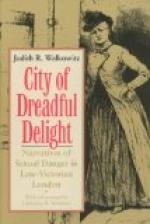At the breach in the Old Wall, the watchers on that almost deserted street saw the brazen wave of four legions gather and sweep forward to gain ground in the city before the mob swept down on them.
Between the two warring bodies, one orderly, prepared but apprehensive, the other mad and perishing, was a considerable space. Fighting still went on at the breach in the walls, but the supreme conflict of a comparatively small body of soldiers and an uncounted horde was not yet precipitated.
Ordinarily, the Roman army could have reduced any popular insurrection with half that number of men. But at present the legionaries confronted desperate citizens who were simply choosing their own way to die. Reason and human fear long since had ceased to inspire them. They were believing now and following a prophet because it was the final respite before despair. There was no alternative. It was death whatever they did, unless, in truth, this splendid sorceress was indeed the Voice of the Risen Prince. Force would be of no avail against them. Madness had flung them against Rome; only some other madness would turn them back.
The Christian, from his commanding position, expected anything.
It was the moment which would show if the false prophet would triumph. If the four legions went down before the multitude, it would mean the ascendancy of a strange woman over Israel, and the obliteration of the faith in Jesus Christ in the Holy Land.
It can not be said that the Christian watched the crisis with a calm spirit. He did not wish to see the heathen overthrow the ancient people of God, nor could he behold the triumph of a false Christ. He put his hands together and prayed.
A figure appeared between the two bodies of combatants, rushing on intensely, to grapple.
It was a tall commanding form, clothed in garments that glittered for whiteness. By the step, by the poise of the head, the Christian recognized Seraiah.
The front of the multitude fell on their faces at that moment as if he had struck them down.
Out of the forefront, the prophetess appeared. The Christian heard her splendid voice out of the uproar, and while he gazed, he saw mad Seraiah turn away from her, with the front of the mob turning after him, as a needle turns to the pole.
In that fatal moment of pause, out of which the warning cry of the prophetess rang wildly, the Roman tribune, in view for a moment under the blowing veils of smoke, flung up his sword, the Roman bugle sang, and the brassy legions of Titus hurled themselves upon the halted mob.
The Christian dropped his head into the bend of his elbow and strove to shut out the sound. The nervous arms of the palsied man at his feet gripped him frantically.
Up from the corner of the Old Wall, came the prolonged “A-a-a-a!” of dying thousands.
Jerusalem had fallen.
The foremost of the mob, turning with Seraiah, escaped the onslaught of the Romans, and as the mad Pretender strode toward the broad street from which the Tyropean Bridge crossed to the demesnes of the Temple, they followed him fatuously, blind to the death behind them and the oncoming slaughter in which they might fall.




